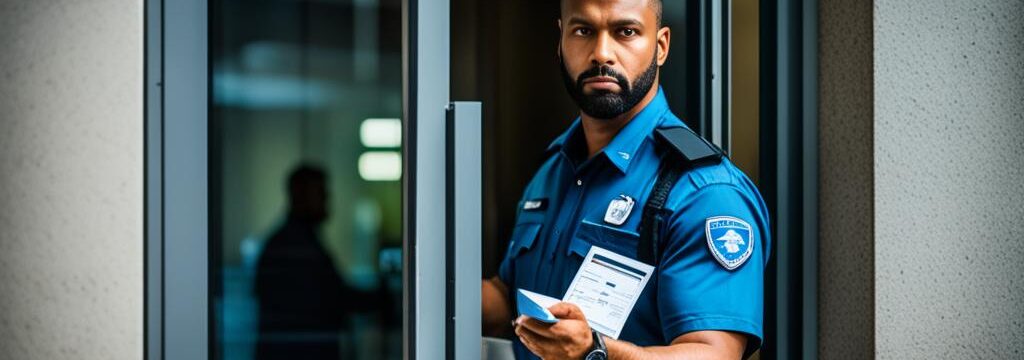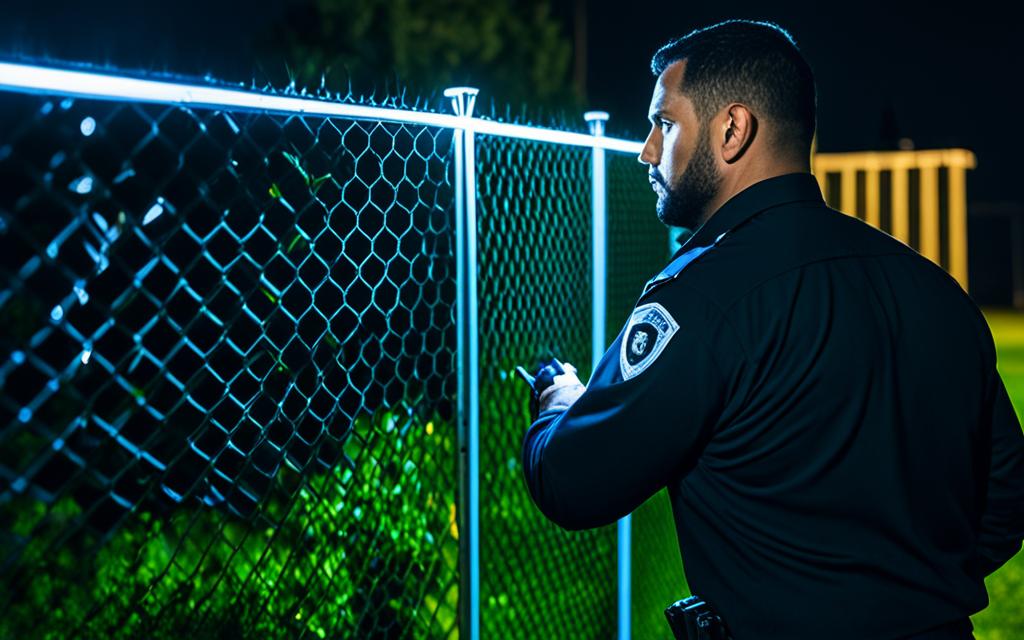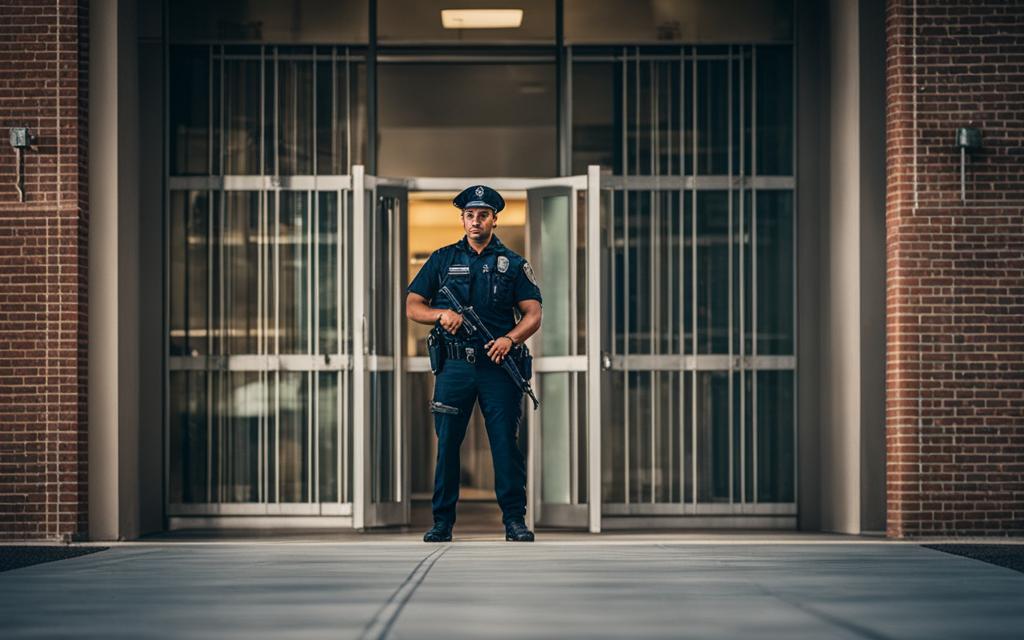What does a security guard do on a daily basis?
- Home
- Security Services
- What does a security guard do on a daily basis?

- January 21, 2024
- By Ryan Bantique
A security guard plays a crucial role in safeguarding premises and ensuring the safety of individuals. Whether it’s a corporate office, residential community, or a retail store, security guards are responsible for patrolling, monitoring, and securing buildings to prevent theft, violence, and rule infractions.
Security guards provide essential security services for businesses and organizations, offering peace of mind to both employees and clients. By maintaining a watchful presence, they detect and deter potential threats, enforce security procedures, and respond promptly to emergencies.
Key Takeaways:
- Security guards play a crucial role in safeguarding premises and ensuring the safety of individuals.
- They patrol, monitor, and secure buildings to prevent theft, violence, and rule infractions.
- Responsibilities include answering alarms, controlling access, writing reports, and operating security equipment.
- Security guards provide essential security services for businesses and organizations.
- They maintain a watchful presence, detect and deter potential threats, and respond promptly to emergencies.
Job Description of a Security Guard
A security guard plays a vital role in maintaining the safety and security of premises. They are responsible for monitoring and preventing security breaches, ensuring the protection of individuals and property.
As a security guard, their main job duties include enforcing rules and regulations, controlling access to the premises, and operating various security equipment. This equipment may include x-ray machines to scan bags and packages, metal detectors to detect potential weapons, and surveillance systems to monitor the premises.
When it comes to enforcing rules, security guards ensure that anyone entering the premises follows the required protocols and procedures. They may also restrict access to certain areas, maintaining the privacy and security of sensitive information or valuable assets.
In addition to their security responsibilities, security guards are responsible for documenting activities and irregularities in detailed reports. These reports serve as key reference materials for future investigations or legal proceedings.
In emergency situations, security guards are trained to respond promptly. They may be required to call the police or fire departments, provide first aid assistance, or evacuate individuals from the premises. Their ability to maintain calm and handle high-pressure situations is crucial in ensuring the safety of everyone involved.
“A security guard’s role is not just about physical presence but also about being observant, vigilant, and proactive in preventing security threats.”
Working as a security guard demands a combination of physical fitness, excellent communication skills, and the ability to make quick decisions. Strong interpersonal skills are essential for interacting with individuals from diverse backgrounds, including employees, visitors, or clients.
The professional conduct and demeanor of a security guard are vital in creating a safe and secure environment. Whether working as a professional security officer in a corporate setting or protecting public spaces, security guards play a crucial role in maintaining law and order.
Typical Day of a Security Guard
On a typical day, a security guard writes reports, patrols industrial or commercial premises, monitors entrances and exits, and maintains order among visitors, employees, or patrons. They may also answer telephone calls, provide information, and inspect and adjust security systems.
In the fast-paced and dynamic field of security, a security guard’s day is filled with a variety of tasks and responsibilities. Let’s take a closer look at what a typical day may entail:
- Writing Reports: One of the essential duties of a security guard is writing reports to document any incidents, observations, or activities that occur during their shift. These reports help keep a record of security-related incidents, ensuring proper documentation and follow-up.
- Patrolling Industrial or Commercial Premises: Security guards are responsible for conducting regular patrols of the premises they are assigned to protect. This includes inspecting different areas, identifying potential security risks, and addressing any suspicious activities.
- Monitoring Entrances and Exits: Security guards play a vital role in monitoring entrances and exits to prevent unauthorized access and maintain a safe environment. They may check identification, verify credentials, and control the flow of individuals entering or leaving the premises.
- Maintaining Order: Security guards are trained to handle various situations and ensure order among visitors, employees, or patrons. They may intervene in conflicts, diffuse tense situations, and enforce rules and regulations to maintain a safe and peaceful environment.
- Answering Telephone Calls and Providing Information: Depending on the specific role, security guards may be responsible for answering telephone calls and providing information to callers. This may involve answering inquiries, directing calls to the appropriate departments, or providing general assistance.
- Inspecting and Adjusting Security Systems: Another crucial task of a security guard is inspecting and adjusting security systems. They ensure that surveillance cameras, alarms, access control systems, and other security equipment are functioning properly. In case of any malfunctions or issues, guards may troubleshoot or escalate the problem to the relevant authorities.
A typical day as a security guard requires strong attention to detail, excellent communication skills, and the ability to respond effectively to various situations. Whether it’s dealing with incidents, maintaining a visible presence, or providing assistance, security guards play a significant role in upholding safety and security.
Other Responsibilities of a Security Guard
While the primary role of a security guard is to ensure the safety and security of a premises, their responsibilities often extend beyond that. Security guards are often trained to handle various situations and may take on additional tasks to maintain order and prevent security breaches. Some of the other responsibilities of a security guard include:
- Warning individuals of rule infractions: Security guards are responsible for enforcing rules and regulations on the premises they protect. They may warn individuals who violate these rules and take appropriate action to maintain order.
- Apprehending violators: When necessary, security guards have the authority to apprehend individuals who pose a threat to the safety and security of the premises. This may involve restraining and detaining individuals until law enforcement arrives.
- Investigating disturbances: Security guards are trained to respond to disturbances and investigate any suspicious activity or behavior. They may gather evidence, interview witnesses, and document incidents for further investigation.
- Operating detecting devices: In order to ensure the safety of the premises, security guards may operate detecting devices such as x-ray machines, metal detectors, or surveillance equipment. They are trained to identify potential threats and take appropriate action.
- Monitoring building systems: Security guards are responsible for monitoring and maintaining various building systems, including fire alarm systems, CCTV cameras, and access control systems. They ensure that these systems are functioning properly and respond quickly to any malfunctions or emergencies.
- Assisting in implementing safety measures during emergencies: In the event of an emergency, such as a fire or natural disaster, security guards play a crucial role in implementing safety measures and guiding individuals to safety. They may assist in evacuations, provide first aid, or coordinate with emergency response teams.
“Security guards not only provide protection, but also act as a deterrent to potential criminals. Their presence alone can help create a sense of security and discourage illegal activities.”
By taking on these additional responsibilities, security guards contribute to maintaining a safe and secure environment for individuals, employees, and visitors. Their professional expertise and vigilance ensure that potential threats are identified and addressed effectively.
Examples of Additional Responsibilities:
| Responsibility | Description |
|---|---|
| Emergency response | Security guards may be trained to provide immediate response and assistance during emergencies, such as performing CPR or administering first aid. |
| Customer service | Security guards often serve as a point of contact for visitors and provide assistance, directions, and information when needed. |
| Loss prevention | Security guards may be responsible for monitoring and preventing theft or loss of property by implementing access control measures and conducting regular inspections. |
Security guards play a vital role in maintaining the safety and security of various settings. Through their commitment to their duties and additional responsibilities, they provide peace of mind to businesses, institutions, and individuals.
Working Life of a Security Guard
Security guards play a crucial role in maintaining safety and security in various settings. In this section, we will explore the working life of a security guard, including their typical schedule, work environment, and the skills they need to excel in their profession.
Typical Schedule: Security guards typically work 40 hours per week with a regular 9 to 5 schedule. This consistent schedule allows them to effectively monitor and protect the premises they are assigned to. However, they may also need to work evenings, weekends, and holidays to ensure round-the-clock security.
Work Environment: Security guards may work in a wide range of environments, including commercial buildings, educational institutions, hospitals, shopping centers, or outdoor events. The specific work environment depends on the nature of their assignment. Some security guards may work indoors, monitoring CCTV cameras and controlling access points, while others may work outdoors, patrolling the premises and ensuring perimeter security.
Teamwork and Individual Responsibility: Security guards should be prepared to handle various situations and often work in teams. They collaborate with other security personnel, as well as with law enforcement agencies when needed. However, they also need to be able to work independently and make quick decisions when faced with security threats or emergencies.
Skills and Training: Licensed security guards undergo extensive training to develop the necessary skills for their role. This includes training on surveillance techniques, emergency response protocols, and conflict resolution strategies. They are trained to operate security equipment such as surveillance cameras, access control systems, and alarm systems. Additionally, security guards must possess good communication skills to effectively interact with visitors, employees, and law enforcement personnel.
“A career as a security guard requires a unique combination of physical fitness, mental alertness, and strong problem-solving skills.”
Overall, the working life of a security guard is dynamic and challenging. They play a vital role in ensuring the safety and security of people and property, making their contribution essential to the smooth functioning of various organizations and events.
| Skills | Description |
|---|---|
| Physical Fitness | Security guards must maintain good physical fitness levels to handle physically demanding situations and emergencies. |
| Mental Alertness | Security guards need to be vigilant and observant to identify potential security threats and respond appropriately. |
| Communication Skills | Effective communication is essential for security guards to interact with visitors, employees, and law enforcement personnel. |
| Problem-Solving | Quick thinking and problem-solving skills are important for security guards to handle unexpected situations and resolve conflicts. |
| Training | Security guards undergo comprehensive training to develop the necessary skills and knowledge for their role. |
Is a Career as a Security Guard Right for You?
Considering a career in security? Being a security guard can be a suitable choice for individuals who possess practical and detail-oriented skills. If you enjoy working with data, following set procedures, and value good communication and problem-solving skills, this career path might be a perfect fit for you.
Working as a security guard requires individuals to be vigilant and proactive in their approach to ensure the safety and security of premises, assets, and people. It demands a sense of responsibility and the ability to stay calm and composed in challenging situations.
While every security guard role may differ depending on the setting, all security officers share a common objective of maintaining safety and protecting against potential threats. Whether it’s securing a corporate office, overseeing campus security, or providing services as a licensed security guard, the role demands dedication and professionalism.
To help determine if a career as a security guard is the right path for you, consider taking a career quiz specially designed to assess your skills, interests, and personality traits. This self-assessment tool can provide valuable insights and help you make an informed decision about pursuing a career in the security industry.
Remember, choosing a career is an important decision that should align with your strengths and interests. So, take the time to evaluate if a career as a security guard is the right fit for you.
Benefits of a Career as a Security Guard
If you are still unsure about pursuing a career as a security guard, consider the following benefits:
- Job Security: The demand for security personnel remains high, ensuring stable employment opportunities.
- Growth Potential: With experience and additional training, security officers can advance into supervisory or management positions within the security industry.
- Varied Work Environments: Security guards can work in a wide range of settings, including corporate offices, retail establishments, educational institutions, and healthcare facilities.
- Competitive Pay: The salary for security guards can be competitive, with opportunities for overtime pay and additional benefits.
- Contributing to Safety: As a security guard, you’ll play a vital role in maintaining safety within your assigned premises, protecting individuals and assets.
Considering the numerous benefits and the potential for personal and professional growth, a career as a security guard can be a rewarding choice for individuals seeking a stable and impactful profession.
Conclusion
Security guards play a vital role in maintaining safety and security in various settings. Whether it’s protecting a commercial establishment, residential area, or event venue, they are on the front lines, ensuring the well-being of individuals and property. Through their diligent efforts, security guards help prevent theft, violence, and rule infractions.
With their responsibilities encompassing patrolling, monitoring, and responding to security threats, security guards are the first line of defense against potential risks. They employ their training and skills to swiftly identify and address any unauthorized access or suspicious activities, providing a sense of safety and peace of mind to those they protect.
By choosing a career as a security guard, individuals can pursue a fulfilling and rewarding profession in the field of private security. With the right training and commitment to professionalism, security companies provide opportunities for individuals to develop their skills and advance their careers in this crucial sector. Whether it’s working for a security services company or as part of an in-house team, security guards make a valuable contribution to maintaining a safe and secure environment for all.
FAQ
What does a security guard do on a daily basis?
Security guards patrol, monitor, and secure buildings to prevent theft, violence, and rule infractions. They answer alarms, control access, write reports, and operate security equipment.
What is the job description of a security guard?
A security guard is responsible for monitoring premises, preventing security breaches, enforcing rules, controlling access, and operating security equipment like x-ray and metal detectors. They also write reports and may call the police or fire departments in emergencies.
What is a typical day like for a security guard?
On a typical day, a security guard writes reports, patrols industrial or commercial premises, monitors entrances and exits, maintains order, answers telephone calls, provides information, and inspects and adjusts security systems.
What are some other responsibilities of a security guard?
In addition to their main duties, security guards may warn individuals of rule infractions, apprehend violators, investigate disturbances, operate detecting devices, monitor building systems, and assist in implementing safety measures during emergencies.
What is the working life of a security guard like?
Security guards typically work 40 hours per week, often with a regular 9 to 5 schedule. They may work indoors or outdoors, depending on the location and nature of their assignment. Security guards should be prepared to handle various situations and often work in teams.
Is a career as a security guard right for you?
An individual suited for a career as a security guard is often practical and detail-oriented, enjoys working with data, and following set procedures. Good communication and problem-solving skills are important. A career quiz can help determine if becoming a security guard is a suitable choice.
Conclusion
Security guards play a vital role in maintaining safety and security in various settings. Their responsibilities include patrolling, monitoring, and responding to security threats. With the right training and skills, a career as a security guard can be fulfilling and rewarding.
Source Links
- https://www.owlguru.com/career/security-guards/job-description/
- https://www.buildingsecurity.com/blog/security-guard-duties/
- https://offdutyofficers.com/the-top-5-duties-of-a-security-guard/





